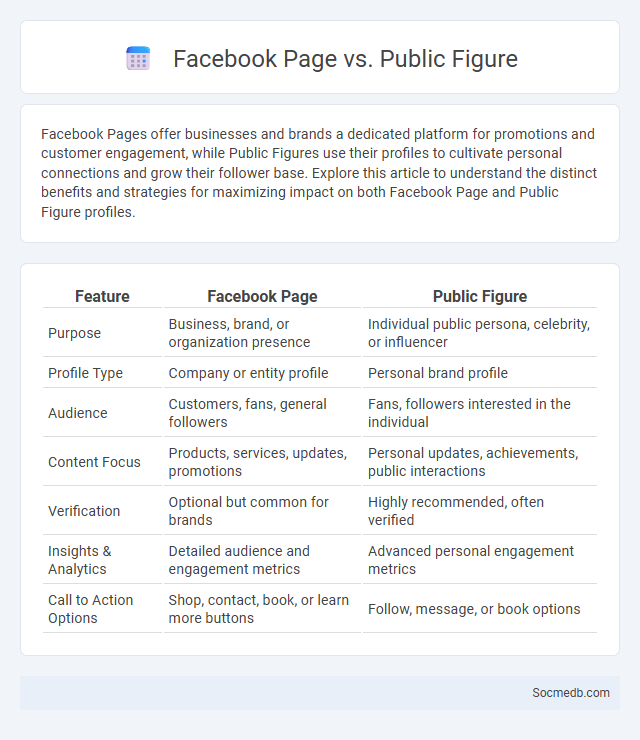
Photo illustration: Facebook Page vs Public Figure
Facebook Pages offer businesses and brands a dedicated platform for promotions and customer engagement, while Public Figures use their profiles to cultivate personal connections and grow their follower base. Explore this article to understand the distinct benefits and strategies for maximizing impact on both Facebook Page and Public Figure profiles.
Table of Comparison
| Feature | Facebook Page | Public Figure |
|---|---|---|
| Purpose | Business, brand, or organization presence | Individual public persona, celebrity, or influencer |
| Profile Type | Company or entity profile | Personal brand profile |
| Audience | Customers, fans, general followers | Fans, followers interested in the individual |
| Content Focus | Products, services, updates, promotions | Personal updates, achievements, public interactions |
| Verification | Optional but common for brands | Highly recommended, often verified |
| Insights & Analytics | Detailed audience and engagement metrics | Advanced personal engagement metrics |
| Call to Action Options | Shop, contact, book, or learn more buttons | Follow, message, or book options |
Understanding Facebook Page: Definition and Purpose
A Facebook Page serves as a public profile specifically designed for businesses, organizations, and public figures to engage with their audience. Its primary purpose is to promote brand awareness, share content, and facilitate direct communication with followers. Understanding how to effectively utilize Your Facebook Page can significantly enhance digital marketing efforts and community building.
What is a Public Figure Profile on Facebook?
A Public Figure Profile on Facebook is designed for individuals who seek to share their personal brand, achievements, or professional life with a broader audience, offering more visibility and engagement tools than a standard profile. This profile type allows public figures to connect with followers, showcase posts, and access insights to better understand audience interactions. Your presence as a public figure can be enhanced with features like verified badges, public messaging options, and the ability to highlight key content.
Facebook Page vs Public Figure: Key Differences
Facebook Pages serve as official profiles for businesses, brands, or organizations, offering tools to engage with a wide audience and track analytics. Public Figures, however, are designed for individuals such as celebrities or influencers, providing features to build a personal brand while connecting directly with fans. Your choice between a Facebook Page and Public Figure profile depends on whether you're promoting an entity or yourself as a recognizable personality.
Types of Pages Permitted on Facebook
Facebook permits various types of pages, including Business or Brand pages designed for companies, organizations, and public figures to promote products and services. Community or Public Figure pages cater to non-profits, causes, and individuals looking to build a public presence. Additionally, Entertainment pages focus on artists, bands, and events, allowing targeted engagement through specialized tools and analytics.
Branding Advantages: Page vs Public Figure
Choosing a Public Figure profile on social media offers enhanced branding advantages by providing personalized credibility and authentic engagement, which builds trust with Your audience. Unlike a standard Page, a Public Figure profile allows for more direct interaction, real-time updates, and story features that humanize the brand. This leads to higher visibility, improved follower loyalty, and better opportunities for influencer partnerships.
Audience Engagement Features Compared
Social media platforms offer diverse audience engagement features such as likes, comments, shares, polls, and live videos that cater to different interaction preferences. Instagram's Stories and Reels provide dynamic visual engagement, while Facebook excels in community building with groups and detailed analytics. Understanding these features helps you tailor content strategies to maximize your audience's active participation and growth.
Content Management and Posting Capabilities
Efficient content management and posting capabilities on social media platforms allow you to schedule posts, organize media libraries, and analyze engagement metrics seamlessly. Advanced tools enable automation, content curation, and multi-platform distribution to optimize your brand presence and audience reach. Leveraging these features ensures consistent, strategic publishing tailored to your target demographics.
Monetization Opportunities for Pages and Public Figures
Social media platforms offer diverse monetization opportunities for pages and public figures, including sponsored content, affiliate marketing, and fan subscriptions. Tools like Facebook's Brand Collabs Manager and Instagram Shopping enable direct revenue generation through brand partnerships and e-commerce integrations. Live streaming features with tipping options and exclusive content subscriptions further enhance income potential for creators and influencers.
Insights and Analytics: Comparing Tools
Social media insights and analytics tools such as Hootsuite, Sprout Social, and Google Analytics offer robust features for tracking engagement metrics, audience demographics, and content performance. These platforms provide real-time data visualization, sentiment analysis, and customizable reports to optimize marketing strategies and improve ROI. Comparing tools based on ease of integration, accuracy of data, and cost-effectiveness helps businesses select the most suitable solution for comprehensive social media performance analysis.
Choosing the Right Option: Which is Best for You?
Choosing the right social media platform depends on your goals, target audience, and content type. Instagram excels for visual storytelling and brand engagement, while LinkedIn is ideal for professional networking and B2B marketing. Facebook offers broad reach and diverse demographics, making it suitable for community building and direct advertising.
 socmedb.com
socmedb.com